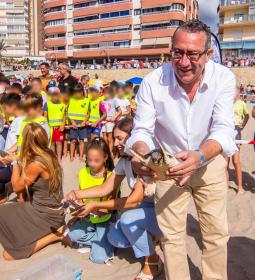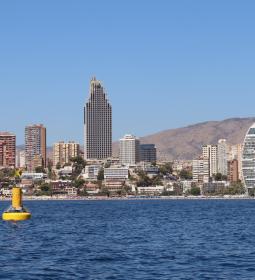Of the 27 eggs laid by the specimen, ten small turtles have prospered, while the rest were not fertilized or only developed a small embryo
The eggs of the loggerhead turtle that spawn in the summer on Poniente beach hatch

The loggerhead turtle that laid its eggs on Poniente beach in Benidorm last August now has offspring. This was announced by l’Oceanogràfic, the facility where the eggs were taken to be incubated after being laid by the mother.
The hatching began last weekend and concluded yesterday in the artificial incubator. Thus, of the total of 27 eggs laid on the beach, ten small turtles have successfully hatched. According to l’Oceanogràfic, some eggs had not been fertilised and others only developed a small embryo, so they were unable to prosper.
The eggs were laid at the beginning of last August on Poniente beach, where a large loggerhead turtle laid 27 eggs that were later taken to Valencia to be incubated at the facilities of l’Oceanogràfic.
It is rare for turtles to choose urban beaches such as those in Benidorm to lay their eggs, so this was a special event. After completing the laying of eggs, the loggerhead turtle, whose scientific name is Caretta, returned to the sea.
Once the turtle was sighted on the beach, the usual protocol in these cases was activated. Technical personnel from the Cavanilles Institute of Biodiversity and Evolutionary Biology of the University of Valencia and Oceanogràfic were sent to Benidorm and were in charge of recovering the eggs deposited by the turtle in its nest.
Once the eggs have hatched, the specimens will remain in captivity for around a year and then will be introduced into the sea, at the same point where they laid their eggs.







